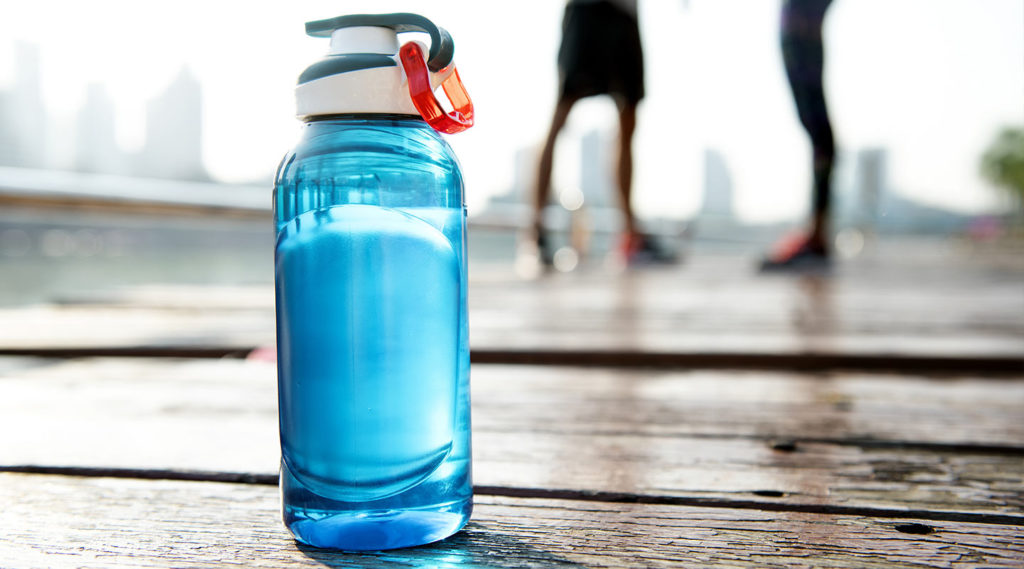
by Stephanie Margolis, R.D.
You are 60% water. That’s right, over half of your body is made of water and requires it to function normally! While you know drinking enough water throughout the day is important, you may not know everything water is doing in your body. Water is vital to help hydrate organs and tissues, while also improving the look and function of your body on the outside. The way we eat and drink determines your hydration status and that’s why we are devoting this space to our buddy … water!
There are many things drinking water does on the inside that you never see. When you get your labs drawn at a yearly checkup, you may not realize it, but your hydration status is being checked. This is quickly identified by your sodium levels. Sodium is an electrolyte in the body critical for many functions including your blood pressure, fluid balance, nerve function, and digestion.
When you are well hydrated, those sodium levels are normal. However, if you are dehydrated, your sodium levels will be too high and can lead to muscle twitching, confusion, and extreme fatigue. Overhydrating is also a real thing, and it can cause the sodium in your body to be too diluted — also leading to confusion, headaches, fatigue, nausea/vomiting, or irritability. Overhydration is not as common, but I have seen this occasionally with distance runners who lose sodium in their sweat and do not rehydrate with electrolyte drinks or supplements.
Water goes further by helping dissolve minerals and nutrients in the food you eat, allowing them to be readily available for the body to use. Alongside keeping our body’s electrolytes in check, water helps regulate your body’s temperature through sweat. Additionally, it hydrates the sensitive tissues in your eyes, nose, and mouth. You probably feel this when you are dehydrated and complain of a dry mouth. Drinking enough water allows your liver and kidney to do their job and flush out waste through urine, sweat, and bowel movements.
Getting enough water throughout the day can also help you sleep better, improve your mood, and help with your cognition. When you are dehydrated, even just a little, you are more likely to feel fatigued. However, if you continue to be dehydrated you could notice more confusion and mood changes. Chronic dehydration often causes constipation, kidney stones, and can even be so severe that your body goes into shock. While these conditions are uncommon in healthy adults, it does stress the importance of drinking enough fluids during the day. If you find you have regular headaches or constipation, your hydration status could be a factor. Studies have shown that fluid loss after exercise can lead to impaired mood and concentration, so be sure to hydrate before, during, and after exercise.
Bottom line: Water helps your inside to function at their best, remove waste, and improve your energy and brain power!
This doesn’t mean showering (though I highly advise doing that on the regular 😉 ). What we are talking about is the impact proper hydration has on the things you CAN see. Let’s start with your largest organ — the skin. Water is a key component of the skin; it helps the skin to protect the body from external toxins and regulate body temperature. When you are lacking hydration, your skin can’t do its job as well and will likely appear dry and flaky. As mentioned above, drinking enough water also helps to make nutrients more available to the body — this directly impacts your hair, skin, and nails as they rely on a variety of vitamins and minerals.
Bottom line: drinking enough fluids will help your skin health!
You are constantly losing water through urination, bowel movements, sweat, and even when you breathe! To function at your best, you need to be drinking enough. There are a few ways to figure out how much you need. The general recommendation (touted by all major medical associations based on new research published in 2015) is:
These recommendations are, of course, general — you may find you need even more hydration throughout the day, especially if you’re exercising or sweating. Pay attention to your thirst mechanism and the color of your urine. Drink when you’re thirsty (though by this time your body is already slightly dehydrated) and/or when your urine is darker than a pale yellow. Avoid drinking more than 2 – 3 cups of caffeinated drinks, as they will have a dehydrating effect when you consume more than 200mg of caffeine (about 2 cups of coffee).
You don’t have to rely on just plain water to meet your needs. You can add flavor to your water with fruit, that also can add some antioxidants. Most foods contain water in varying levels, especially fruits and vegetables. Foods like soups and smoothies are also a good source.
We’ve talked about how to eat pre- and post-workout, you have access to amazing fitness programs in the Studio, and now hydration is a third pillar to include in your health. If you begin a run or workout dehydrated, you will not be able to make up for that during your workout, which can impact how hard you can push or the mileage you can cover. How much to drink? Here come the numbers:
